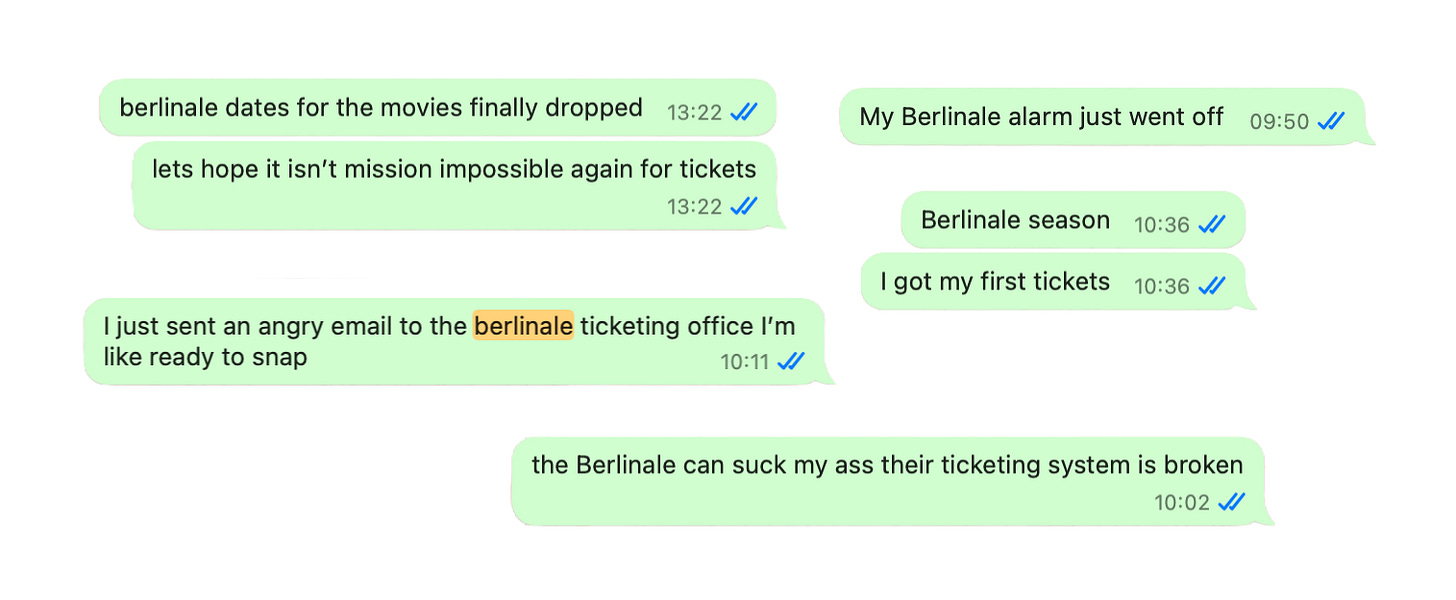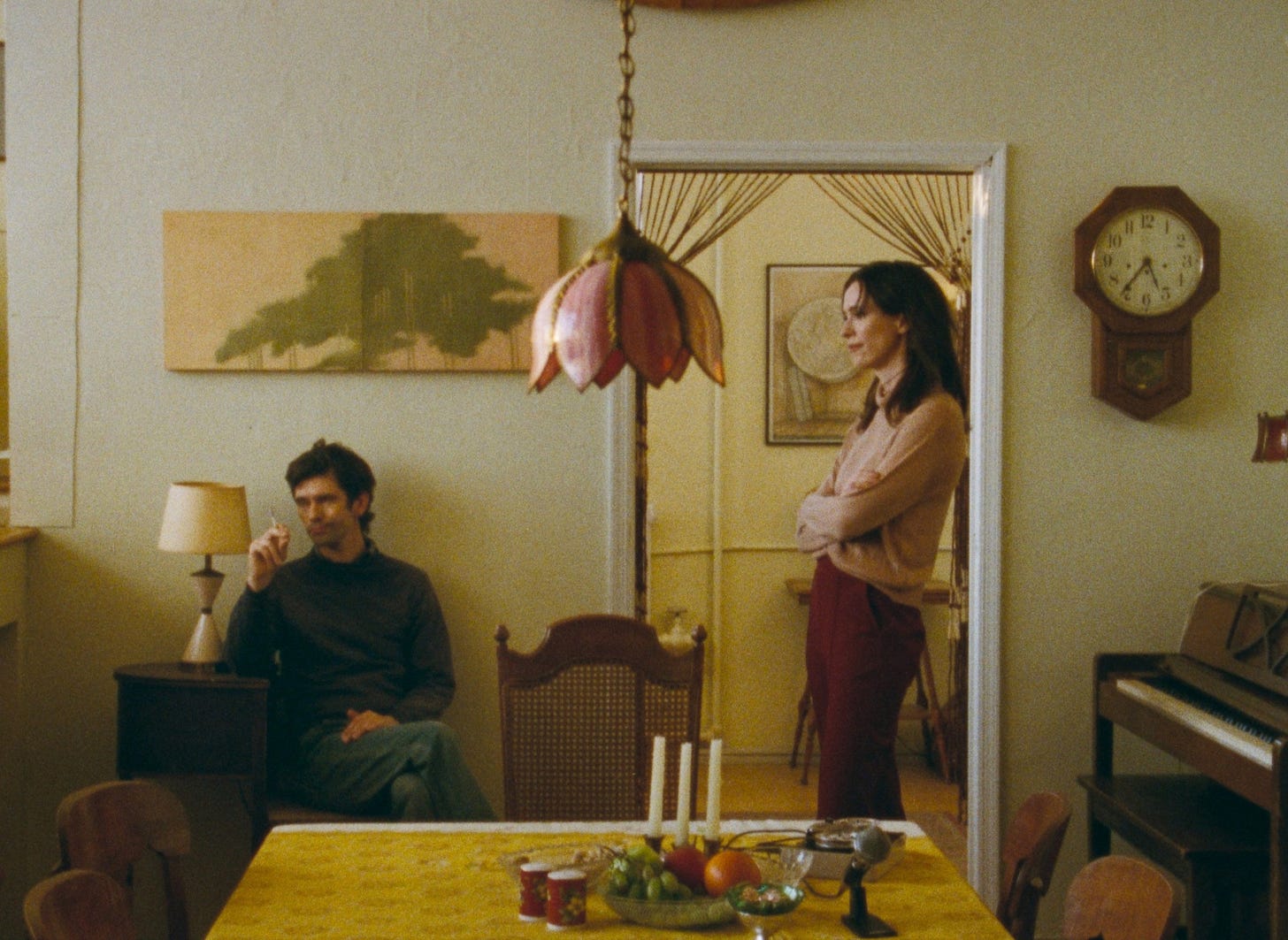Hello, devoted fans. I once again took an extended siesta from publishing because March was very busy — and I decided that writing one good thing is better than churning out something to fill the space. Besides breaking my phone screen with an accidental direct hit from my belt buckle as I tossed it onto my bed, my past month was punctuated by fun writing assignments.
In early March, I visited Spain for 24 hours to report on Refik Anadol’s new site-specific AI artwork at Guggenheim Bilbao for ARTnews, which made me feel slightly dizzy and very skeptical of the motives and money fueling this kind of art. I may not have been moved by Anadol’s overstimulating spectacle, but I did leave the museum grateful for two things. The first was American artist Paul Pfeiffer, whose exhibition “Prologue to the Story of the Birth of Freedom” was one of the best shows I’ve ever seen. The second was the quiet solitude I spent walking around Richard Serra’s weathered steel sculptures. I’ve loved this series since first encountering the sculptures in Dia Beacon, and I’ll love them forever.
At the end of March, I traveled to Bolzano, Italy, where I attended the opening of Museion’s landmark “Graffiti” exhibition. I did get lost in Italy on the way there because my flight took me to Verona, not Bolzano, but I made it to the show and loved it. That report will be out soon. I’m also ecstatic to finally say… I have an essay (on text t-shirts) in the huge 20th-anniversary edition of Fantastic Man, a magazine I’ve spent years dreaming about writing for. I also wrote something anonymously for a very fun, very hateful content series on another newsletter that’ll be out soon.
And, of course, I wrote an essay on the Berlinale, which is why you’re here. This essay originally appeared in One Thing, the twice-weekly newsletter cataloging the “good things, real things, interesting things” online and off. I’ve also written about chasing a vibe pic, livestreaming classic cinema, and Netflix’s charmingly polite dating show for the newsletter; I encourage you to read all of those essays and then tell me you’ve read them because, one, it would make me happy and, two, they are very good.
Welcome to Public Service.
Haunting the 2025 Berlinale International Film Festival.
An acclaimed photographer recounting his day in a New York City loft. A bug-eyed fan infiltrating a musician’s LA orbit. A young Taiwanese gangster struggling to avoid another jail sentence. These are the stories I watched on screen as the Berlinale International Film Festival descended on the cold, grey German capital in February for its 75th edition. The three films I caught — Peter Hujar’s Day, Lurker, and Silent Sparks, respectively — were of wildly varying quality. But with Berlinale, it’s not so much about quality as it is about the experience as it occupies the city I’ve called home since 2018. As Nicole Kidman says, I come to this place for magic; sometimes the magic just happens to be more Criss Angel than Harry Houdini.
Though it’s technically part of the European “big three” film festivals (alongside Venice and Cannes), the Berlinale feels a bit more grounded despite the wattage of star power that descends upon the city. That may be because major cultural events like the Berlinale never seem to get taken very seriously by locals here. You can google the festival and read about how the 2025 edition sold over 336,000 tickets (breaking its all-time record), yet three years into attending, it still feels almost laughably niche. Still, there’s something soothing in how lowkey it feels. Every February for the past three years, I happily embrace another year of the Berlinale, allowing it to take over my mind like a contagion.
The virus that is cinephilia creeps in slowly enough. After the film program for the year is announced, I dash to the website and methodically scroll through pages of titles I’ve almost always never heard of, save for a few Sundance standouts. It’s a slog as I gauge the vibes of a film from a brief synopsis and a few stills, trying to discern quality like a cinematic Miss Cleo. It’s difficult work, but soon, I’ve drafted a preliminary list of standouts in my Notes app, half of which I’ll forget all the details of by the next morning. I text some options to friends, though I already know they’ll decide last-minute and not weeks in advance like the Type-A planning demon I become during Berlinale season.
With the groundwork set and my list made, the waiting game begins as I stalk my prey: the unwieldy, unreliable Berlinale ticketing system. For the past two years, without fail, the ticketing system has failed like the Challenger. This is very on-brand for Deutschland, given that 82% of German companies still use fax machines (not a joke). Germany is so technologically impoverished it makes the USA look like The Jetsons, yet I still hold out hope every year that the festival will implement a functional way to buy tickets. In theory, according to the website, online tickets are “always available three days in advance, always from 10.00 am (for example, on a Monday for the following Thursday).” In practice, I set my alarm like a Pavlovian dog for 9:57 am, navigate to the program page, watch the clock strike 10:00 am, and… watch as 90% of the tickets show as “sold out” by 10:01 am.
Trying to follow the rules of their impossible system while knowing full well that the experience will bring me nothing but suffering feels like sticking my hand into the Dune pain box every day for ten days. The good news is that tickets are usually available eventually. The bad news? They’re available an hour or two before a film is set to start, which works well for the spontaneous among us. I, unfortunately, was not born with this specific gene. My idea of a good time is buying tickets for premieres or special screenings over a month in advance. But for the Berlinale, I have to embrace the chaos, lest I miss all the films that may never get European distribution. Each viewing is a gamble, but here are my takeaways, Letterboxd style.
Silent Sparks — dir. Chu Ping
Someone directly behind me began loudly snoring within 20 minutes of this 79-minute disaster, and I will envy him for the rest of my life. Everything that should have worked here — gay tension, gangsters, Taiwan’s criminal underground — is tossed aside in favor of what I can only describe as “brooding” as rendered by an alien new to Earth. Picture this: one person speaks, the other silently stares at them, and… the scene ends. Over and over again for an hour. I know it's called Silent Sparks, but everyone involved seems to have gotten stuck on the first word and forgot to add the spark.
Lurker — dir. Alex Russell
The directorial debut of Alex Russel (a producer on Beef and The Bear) was one of the gems of the festival, thanks largely to Théodore Pellerin’s star turn as a fame-hungry leech that had me crawling out of my skin. I couldn’t look away, and that’s a testament to the control and confidence of Russel’s exacting eye. Finally, a film on the parasitic nature of fame and fandom that doesn’t feel cliche or made to be stripped of depth and disseminated on social media.
Peter Hujar’s Day — dir. Ira Sachs
After watching Ira Sachs’ brilliant Berlinale film Passages twice at the festival in 2023 (and one more time during its theatrical run), I was ready to sit for anything Sachs presented. This adaptation of a lost transcript between famed queer photographer Peter Hujar and his friend Linda Rosenkrantz was more of an experiment than a movie. Two people, one apartment, and a glimpse into 24 hours of Hujar’s life. There are worse ways to spend 70 minutes than watching Ben Wishaw chat shit about the 1970s New York City art scene in a beautiful apartment.
I have been a diehard lover of “the moviegoing experience” since the moment I enthusiastically broke child labor laws as a 13-year-old working in my hometown’s two-screen movie theater. In those formative years of early cinephilia, I’d watch literally any movie that we screened. My tastes may be a bit more discerning now, but the Berlinale revives a bit of that adolescent magic; it’ll never not be exciting to shuffle into a packed movie theater with only the vaguest sense of what I’m about to see. The electric crackle of intrigue that comes with watching a mystery movie is heightened, too, by the fact that I’m just one of many in the crowd eager to be surprised. And yet the festival’s presence in the city can feel somewhat shrouded; the city moves like water around the screenings as strangers congregate inside theaters and then disperse back into the scrum. Huge movie stars walk a red carpet outside of the Berlinale Palast while a block away, unsuspecting tourists huddle in a fast food restaurant, tired after a day spent seeing Berlin’s many monuments.
If I remember anything about this year’s edition, it’ll be just how insular the experience felt. Maybe it was because this year’s Berlinale happened as our transit workers went on strike, the weather dipped below freezing, and I had to trudge to a dermatologist to have an errant mole removed. Or maybe it was just me. I had deleted my Instagram app at the start of the year, and in the weeks of readjustment that collided headlong with the Berlinale, I came to feel unmoored. Gone were all of the posts I used to see about exhibitions or parties or pop-ups, this dense cloud of culture hovering online, just out of reach.
As I left these screenings, the usual urge to post an Instagram story of a movie poster or low-lit cinema hit like the itch of a phantom limb. Sure, I may have logged my thoughts on Letterboxd for my meager 43 followers, but this year’s festival left me feeling like a tree falling alone in the forest. With no need to make a sound on Instagram performing the act of dedicated cinephile, I finally just allowed myself to sit back, relax, and enjoy the experience.





